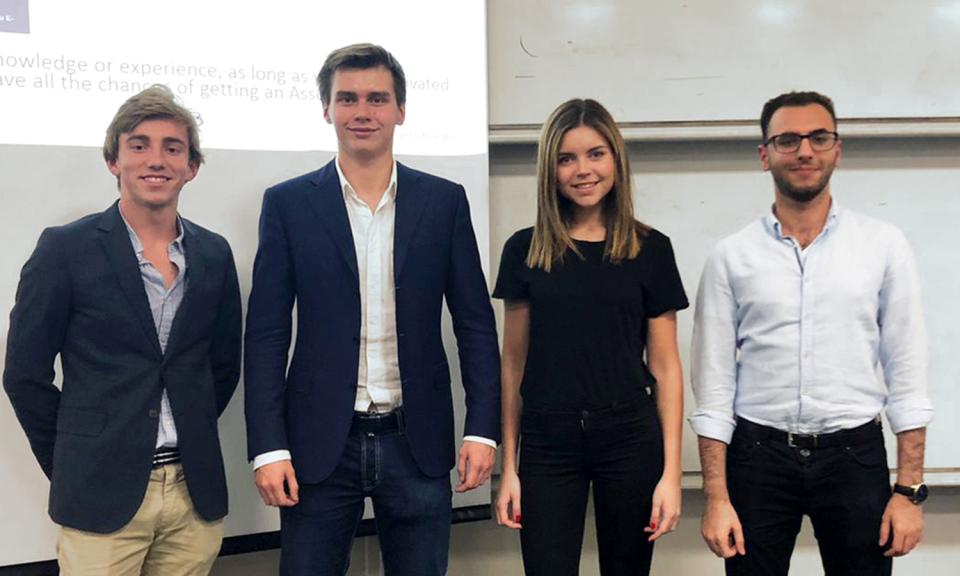
Maryna Omelchenko (MSc Management 2017) is the founder & CEO at Careerhub. We spoke to her about the UK recruitment sector and how she is helping international students find their dream job in the UK.
Why did you decide to start a business in career training and recruitment?
My ambition to start a business in the recruitment sector came from my desire to help young people make better career choices - especially international students in the UK, who have incredible talent and potential, but are often limited by their immigration/visa status. Having been an international student myself, and experiencing the challenges and difficulties of career decisions and immigration obstacles, I was driven to make an impact and help young people build fulfilling careers.
How did you start your business?
I started working on Careerhub during my MSc Management programme. As the elected student Career Leader for my cohort, I worked closely with the Imperial College Business School Career Services Management Team, the Student Union and Student Societies to implement a number of career-related initiatives.
After graduation I worked in strategy consulting and M&A at EY-Parthenon, working with a number of leading edtech and digital technology companies to advise them on digital innovation, product development, business strategy, market entry/ growth strategy.
While working, I continued to mentor and coach students on a part-time basis, which provided a great market research and market testing opportunity for me. For over two years, I used the ‘lean startup’ approach to do business validation, build industry expertise, develop customer knowledge and test product-market fit for different business iterations.
My ambition to start a business in the recruitment sector came from my desire to help young people make better career choices - especially international students in the UK, who have incredible talent and potential, but are often limited by their immigration/visa status.
All this experience gave me solid business and commercial skills and industry expertise in the education and digital technology sectors, which prepared me to launch my own recruitment tech startup.
How have you found starting your own business?
I have built and scaled the business to profitable operations, delivering services to hundreds of students and graduates in the UK. I am responsible for all areas of the business, including strategy, operations, product design and development, sales, marketing etc, and achieved a 250% yearly growth rate since the start of operations. I also worked with a number of business leaders and industry experts, including those at leading UK accelerators and incubators, successful entrepreneurs, and the Imperial Enterprise Lab, which helped me to scale the business and secure a number of partnerships and collaboration deals with startups and universities in the UK.
What market insights about the UK recruitment sector can you share?
Technological advances and political and societal shifts are having significant effects on the way individuals work, get hired, and build their careers. The recruitment sector is being disrupted by new technologies such as AI and machine learning, helping companies hire the best talent, and helping job seekers make more informed career choices for the long-term. For example, AI-powered platforms allow students to get more personalised and tailored job recommendations based on their profile preferences and skills, while adaptive and predictive technologies give applicants the most effective training and preparation based on their unique strengths, weaknesses and learning styles. These innovations have the potential to transform the way people work.
How can graduates best deal with the current challenges and trends in recruitment?
The main challenges revolve around getting the right job, regardless of visa or immigration restrictions, and understanding the recruitment and hiring process in the UK. The most common issue is the lack of diversity in roles and opportunities on a Tier 2 visa, which forces a large number of international candidates into business and professional services roles. The best way to tackle this is to prepare long-term career plans that match individual career ambitions, for example selecting the right first job that will maximise the ability to switch to their desired career in the long term. I also advise students on alternative visa and immigration solutions in collaboration with immigration solicitors to widen students’ career options and opportunities, including companies that do not offer Tier 2 visa sponsorship (such as startups, creative industry companies, marketing agencies etc).
It is essential to have a clear insight of the recruitment process in the UK to be able to prepare for job applications, as well as focusing on less conventional recruitment strategies that yield the most successful results – such as networking with target companies, getting shadowing work experience and leveraging connections and the alumni network to get a foot in the door. These strategies have proven to be very effective at helping students get the best job offers in the UK.
How did Imperial help you with your business venture?
Imperial College Business School has one of the best Careers team in the UK, with a wide variety of programmes that help students build successful careers across industries. These include career consulting and coaching sessions, skills training sessions, employer-led training programme, alumni support schemes and work experience opportunities with a number of companies. These initiatives benefited my own learning and development while I was studying as I gained valuable insights and exposure across a number of industries. I was also able to network and connect with many employers, which helped me with my career choices, job applications and interviews and allowed me to get several job offers at leading strategy consulting firms in London.
